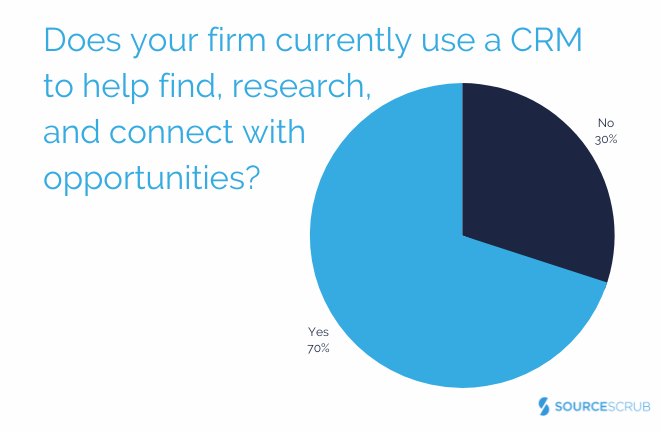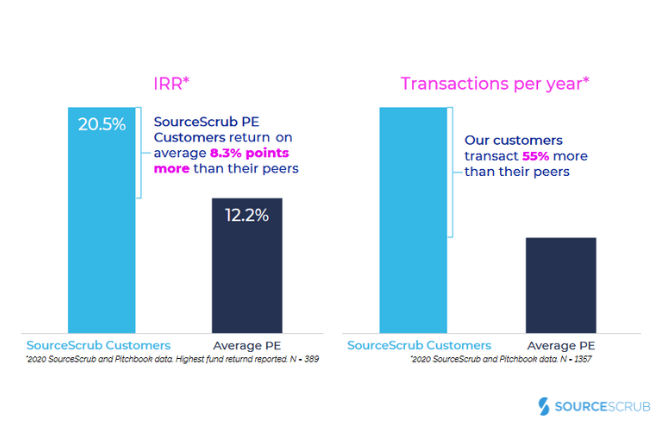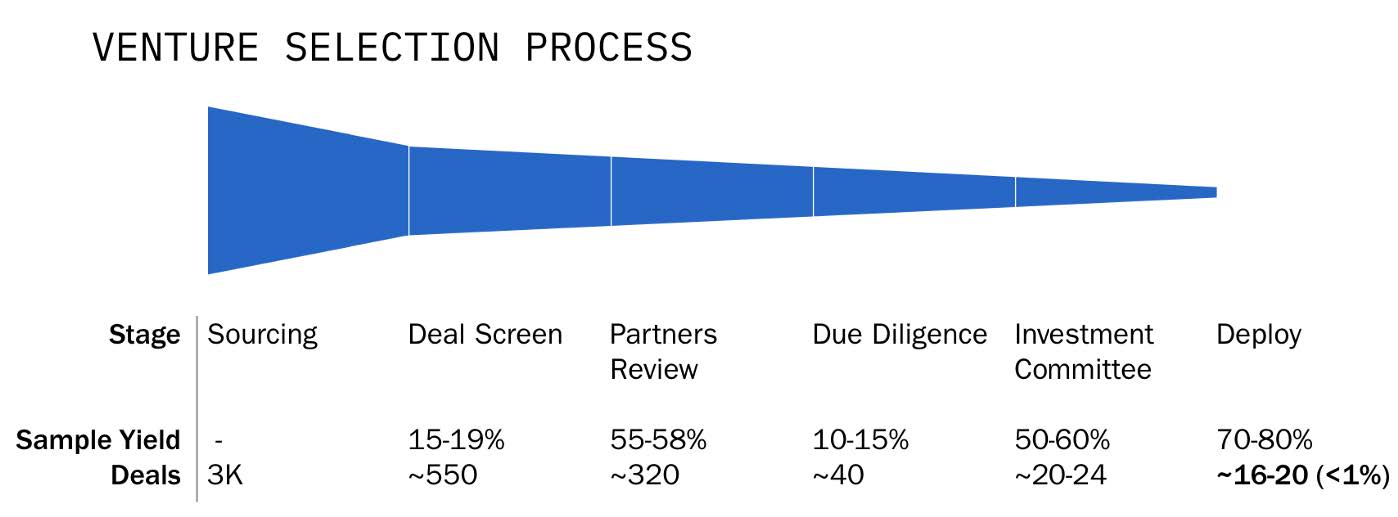
One of the most valuable tools in a dealmaker's kit is the CRM. Yet in a recent survey, we found that 30% of firms don't have one.

Any firm without a CRM "or one that's not using their current CRM to its full potential "is losing out on deals. Whether you're curious about how to choose a CRM for the first time or wondering which specific features to prioritize, this post explores the basics of what a CRM is, its benefits for private equity, and the features and top options for vendors. Let's dive in!
CRM stands for customer relationship management. CRM systems are purpose-built to track, organize, and centralize all the data you capture about both current and potential portfolio companies throughout your deal flow process and M&A pipeline, from initial outreach to financing to realization "and beyond.
CRMs house all current and prospective investments' contact information, including all your firm's interactions with them: e.g., emails and phone calls to notes from in-person meetings and engagements with your website, social media, or content. The true purpose of CRMs, though, is to help you track important details about opportunities: where they sit in your deal flow, whether they have specific needs or concerns, if they're talking with other firms, etc.
When first thinking about using a CRM, some firms may attempt to use spreadsheets or try to retrofit another existing system to serve a CRM's purposes. However, most of these efforts are not worth the investment as the end result not only forces teams to develop bad habits that compensate for insufficient technology, but the software itself also lacks the key features necessary to streamline your dealmaking process.
To help you identify what you should be getting out of your CRM, let's go over the benefits of a CRM for private equity firms.
Whether your firm is using a CRM or not, it's important to know the benefits that one can provide. This way you can ensure you're being highly strategic with your dealmaking processes and using each platform in your tech stack to its full potential.
With the proper integrations, CRMs centralize data from across disparate applications and communication channels. This eliminates information silos, improves data accuracy, and helps drive organizational alignment. Having meaningful conversations and making data-driven decisions that improve the overall health of your firm is much easier for teams where everyone has access to the same set of information.
When set up properly, CRMs can prevent BD teams from duplicating efforts and wasting time on irrelevant opportunities. By identifying what signifies an ideal company, including how it interacts with your firm and whether its structure and details align with your investment thesis, your team can spend time only on the companies most likely to transact.
Even simpler CRM options will usually have some automation functionality, such as lead routing or integrations with data services and sales automation tools, which help eliminate manual data entry and streamline administrative workflows. More advanced CRMs have the ability to automate much more of your deal flow process, including automatically moving deals through the pipeline and performing certain actions when specific criteria are met (e.g., following up with templated emails, reminding teams to re-engage a cold lead after a certain period of time, etc.).
With all deal-related activities clearly tracked and organized in a single source of truth, dealmakers have definitive lines of ownership and team members can be held accountable for individual performance. More advanced CRMs have the ability to report on activities like calls and emails, as well as export this information to other platforms for more advanced analysis and insights.
Having information about every prospect interaction at their fingertips makes it easy for BD teams to deliver more timely and engaging outreach. This level of personalization not only increases connect rates, but it also helps cultivate more meaningful relationships with opportunities over time. CRMs are usually tied very closely with marketing automation tools via integrations, allowing for easy follow-up, nurture for colder leads, and larger scale marketing efforts that can be automatically triggered based on where a deal is in the pipeline.
Consistently tracking data throughout the deal flow process reveals insights that can be used to help forecast results, identify bottlenecks and areas for improvement, and optimize deal outcomes in real time. In fact, dealmakers that harness technology and take a data-driven approach in their sourcing efforts transact 55% more and generate IRR 8.3 percentage points higher than their peers. While CRMs usually have a certain amount of reporting available in-platform, integrations with business intelligence and advanced reporting platforms can take this data to an entirely new level.

With so many options available for a CRM, in order to choose the best CRM for your private equity firm, you must learn how to create a CRM strategy. A CRM strategy is much more than just choosing a software. It must also consider the people involved with your CRM (both who will use it and who will be supporting your team's use of it), as well as the processes that will dictate its usage. This is often known as the PPT framework.

Only by balancing all three parts of the framework can your firm create a winning strategy for best utilizing a CRM. To help you create a CRM strategy, here are a few questions that your firm must answer:
Perhaps the easiest question to ask is also the most difficult to answer. Your reasoning for choosing a CRM to incorporate into your dealmaking process needs to be based on more than "We heard a CRM was good for our firm." While the answer to this question should be something simple and high level (e.g., "We need to better track our deal flow as it moves through the pipeline"), it's imperative that you declare your goals and top-down vision for how your firm will use the platform.
Adding in specific goals and defining the type of insights you eventually want to uncover at the beginning of your search helps ensure you identify the features and benefits of a CRM that are most important to you, as well as capture the right information to use down the road.
Knowing what an ideal opportunity looks like will fuel everything you do in the deal sourcing and dealmaking process. An investment thesis helps you identify and source the right opportunities for outbound. It also helps qualify inbound opportunities for follow-up and informs your lead scoring calculations to help your team be more efficient and productive.
A key part of this process, especially within the CRM, is to make sure you're capturing the right data points for you to properly evaluate and refine your investment criteria. Choosing a CRM with the right integrations to make use of whatever data points you decide to capture is also so important. More on this later!
Every firm sources, evaluates, and closes deals differently than others. As you're building out the strategy for how to choose a CRM, you'll need to map out what stages and events an opportunity goes through along its journey to join your firm's portfolio. While the general steps are largely the same from firm to firm, what actions constitute each stage and which information qualifies an opportunity to move from one to the next will vary.

Sometimes firms must consistently reach out to grow trust and rapport with companies they hope to close. This process can take months or even years, especially during periods of market uncertainty. In addition, once you close a deal, the relationship with this new investment is far from over "especially in the private equity industry.
Depending on the transaction type, your firm may be managing the acquired company or potential merge with an existing company for years to come. Clearly defining what interactions you will continue to have with the different types of contacts in your CRM will help you better understand the entire journey they have with you, what data you need to facilitate that journey, and how to set up your CRM to support your efforts.
Change management is no simple feat, especially when you're changing how your firm creates revenue. But the benefits of a CRM far outweigh any potential disruptions as long as your firm properly understands and undertakes the implementation and adoption process.
While the successful deployment of a CRM will be different for every firm based on your answers to the above questions, there are three basic tenets to follow:
Choosing the best CRM for your private equity firm is key here. With how many vendors there are, let's discuss how to choose a CRM.
Once you've decided on your CRM strategy, your next step is to match that strategy with the most important CRM features for your firm. Depending on what your goals are for using a CRM "complete customer database, automation, data integration, etc. "you can create a "hit list" of features to look for both now and as your use of the platform expands.
Contact/Relationship/Lead Management
Arguably the most basic functionality of a CRM, your chosen platform should be able to adequately collect and track information about every person, company or opportunity, etc. your team engages with. More advanced CRMs will also let you define custom fields that are specific to either your industry or your firm (e.g., current funding round, investment thesis match) to better act on the data you store.
Pipeline Management
On top of collecting data about contacts and companies, you must also be able to use that data to accurately track the journey your opportunities have with you. This capability is one reason why understanding your firm's deal flow process is so important to properly implementing a CRM. Once you have determined a process, your CRM can help you move opportunities through the pipeline far more efficiently.
Communication Methods
At a basic level, your CRM should allow your team to track email activity either within the platform or in your chosen email software, such as Outlook. More robust CRMs will have integrations or add-ons for advanced types of communication, including social, blast emails, or chat.
Integrations
You cannot and should not expect your CRM to do everything for your firm, so integrations are by far one of the most important requirements for choosing a CRM. In fact, according to IDC, 81% of business leaders say "different internal systems/applications that don't 'talk' to each other" are why issues surface in the business. You need to build the right tech stack that works together with each software doing what it was intended. Some typical integrations are:
Sales Automation
According to Deloitte, data mastery and intelligent workflows are the specific areas of digital transformation driving the greatest measurable impact for businesses today. But automation is a particularly powerful feature, and it can be a slippery slope. If you've never had a CRM before or if your processes aren't perfect, automating your sales processes quickly becomes dangerous. So, while you may wish to get a platform that can handle sales or workflow automation, take note that it may be something your firm should take advantage of in the future, not right away.
Reporting and Dashboards
Many CRMs come with basic reporting capabilities. But for most firms, analytics are usually better handled using a dedicated reporting tool that you integrate your CRM with. This is especially true if you have multiple systems "such as a deal sourcing platform "with important data that must be merged together. Most CRMs understand their own limitations, however, and will offer integrations with the more popular business intelligence tools that can get the job done.
Document Management
Especially for private equity firms with confidentiality agreements, proprietary information, and data compliance regulations abound, document management can be high on the list of desired CRM features. After all, automatically creating documents, requesting signatures, and then storing those documents sounds like a great time save. Just be cautious that you know what it will cost you, as native functionality is often locked behind the highest pricing plan or only available via an integration.

Now that your firm has created its CRM strategy and is aware of the key features of a good CRM, it's time to finally choose your platform. Before we dive into the list, there's an important distinction to make, though: the difference between "CRM platforms" and "deal-specific CRMs."
Three of the largest names in CRM, Salesforce, SugarCRM, and Microsoft Dynamics 365 are the former: CRM platforms that can serve a wide range of industries. As such, they offer a large variety of app integrations and more robust automation capabilities, but they must be configured to fit your firm's use case "and may require a dedicated headcount for you to take full advantage of them.
Deal-specific CRMs, however, such as Dynamo, Affinity, and DealCloud, were designed specifically for the private equity industry, so they may take less effort to get up and running.
Perhaps the largest name in the CRM space, Salesforce is the go-to vendor for countless businesses. Salesforce is a top choice for CRMs, but as we mentioned earlier, it's a platform in all senses of the word: it's designed to be a jack-of-all trades and requires significant customization and cost to mold it to fit your specific business. So while it can be extremely powerful, it's a big undertaking for dealmakers to implement Salesforce well.
Pricing: $75/user/month (Sales Cloud Pro plan)
Top Features:
Why Choose Salesforce: Build exactly the tech stack you want with its countless integrations and customizable platform.
A CRM platform akin to Salesforce, SugarCRM offers a lot of features and capability to its users. Its CRM offering, Sugar Sell, touts itself as more of a sales automation solution versus "just" a CRM, so if your firm is looking to take advantage of the efficiencies you can gain from automation, SugarCRM may be the right choice.
Pricing: $85/user/month (Sell Advanced plan)
Top Features:
Why Choose SugarCRM: To increase efficiencies and help accelerate the deal flow process via sales automation.
The third CRM platform in this list, Microsoft Dynamics 365 offers solutions for those in sales, marketing, customer service, finance, and even the supply chain industry. As such, it may take more time to configure the platform to work for your firm, especially if you have a smaller team and no dedicated deployment/administration resources.
Pricing: $95/user/month (Dynamics 365 Sales Enterprise plan)
Top Features:
Why Choose Microsoft Dynamics 365: You want a fully-connected experience across all of Microsoft's products (including Office 365).
Dynamo calls itself an investment management platform rather than a CRM, but its end goal is the same: to help your firm "focus efforts on the human touch and insights that make your firm succeed." Dynamo understands the private equity and venture capital industry, so you get more features that are better aligned to the space
Pricing: Not publicly available
Top Features:
Why Choose Dynamo: Purpose-built for fund managers' deal processes, this deal-specific CRM will have you up and running quickly.
Another deal-specific CRM, Affinity focuses on "relationship intelligence" to help dealmakers better manage the entire deal flow process. The Affinity CRM understands the relationships dealmakers have with their network are often what makes a deal happen and seeks to facilitate those relationships through smart automation and suggestions for how to use that network.
Pricing: Not publicly available (Some websites report that plans start at $150/user/month)
Top Features:
Why Choose Affinity: If your firm focuses more on networking and relationship-building to source and close deals, this CRM is for you.
DealCloud is "not just a CRM" that offers features for dealmakers beyond other deal-specific CRMs, including marketing and finance capabilities. Intended to be your firm's single source of truth for far more than just your investment opportunities, DealCloud offers comprehensive features for all parts of your firm's operations.
Pricing: Not publicly available
Top Features:
Why Choose DealCloud: When your firm wants an all-inclusive management platform, but one that's specifically built for dealmakers and principal investing professionals.
Choosing a CRM is no small undertaking. Such a powerful tool requires firms to put in significant strategy and thought to ensure its success. But a CRM is still only one part of the software your firm should be using to properly source and manage deals. To learn about the core components every firm should have in their tech stack, download our guide with everything you need to know about the modern dealmaker's tech stack.